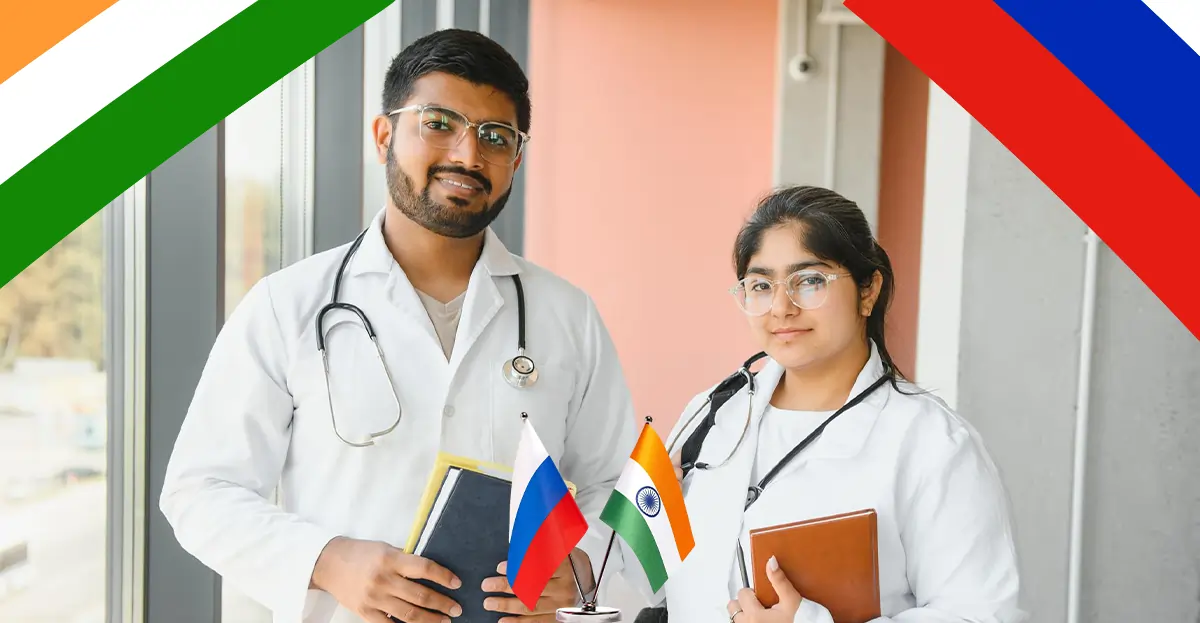Choosing the right place to pursue a reputed MBBS programme is a critical decision for aspiring doctors. With the rising competition and evolving medical education standards, students often find themselves torn between studying in India or opting for MBBS abroad, particularly in countries like Russia, which has long been a popular destination for Indian medical students.
As we step into 2025, both options have their pros and cons, and it’s essential to understand these differences before making a decision. In this article, we’ll explore the advantages and challenges of studying MBBS in Russia and India, helping you make an informed choice.
Why Should You Choose to Pursue MBBS in Russia in 2025?
Over the years, Indian medical students have grown to prefer Russia as a destination. Here’s why:
Affordable Tuition Fees
Students from India often apply to receive an MBBS degree in Russia because the cost of education is relatively low there. Medical students spend an average of $3000-$7000 per year to study in Russia, which is far cheaper as compared to the MBBS in India in private colleges.
Affordability and a relatively low standard of living make studying for an MBBS in Russia attractive for a student with a middle income.
Globally Recognized Degrees
Among the Russian medical institutions that offer NMC-approved foreign medical degrees that have international recognition are Perm State Medical University, Mari State University, and Mkhitar Gosh Armenian-Russian International University from Armenia. Once Indian students finish their studies at any of Russia’s handled universities, they will be eligible to practice Indian medical practice after passing either the FMGE or NExT exam introduced in 2025.
No Entrance Exams
Different from India’s tough NEET UG exam, several Russian universities hold direct enrolment for Indian students, mainly based on their 12th-grade scores in Physics, Chemistry, and Biology. The admission is based straightforwardly on qualifying marks so that students are spared entrance competition stress.
Well-Equipped Labs and Medical Infrastructure
Well-known Russian universities provide a class curriculum with superior teaching approaches, sophisticated establishments, and properly maintained labs. Russian medical universities provide students well-stocked with practical experience and clinical observations to carry out actual medical work.
Cultural Diversity and Global Exposure
Russian medical education provides a cosmopolitan environment for its students to learn a well-rounded global mindset. Such exposure is very helpful to students who want to study medicine in a foreign country.
Challenges in Pursuing MBBS in Russia.
The advantages of studying MBBS in Russia are many, which, however, do not make the difficulties that come with it an iota less.
Language Barrier: While the curriculum for MBBS is in English and Russian is not strictly part of the requirements, students are required to learn the language in order to practice medicine because they will meet patients who speak Russian.
Climate Differences: The frigid winter of Russia may cause students from a warm, tropical country like India to struggle.
FMGE/NExT Clearance: The FMGE or NExT exams, both notoriously difficult, are required of international MBBS graduates who want to practice medicine in India. This requires additional preparation.
Why Should You Choose to Pursue MBBS in India in 2025?
Familiar Environment and Language
If you are pursuing an MBBS in India, it means there is no need to struggle with language or culture while studying for your course. What you will gain from the convenience of having your family close by and being surrounded by an identifiable social environment.
Quality Medical Education
India is famous for esteemed medical colleges that include AIIMS, JIPMER, and CMC Vellore, distinguished by quality academic and clinical training.
Direct Pathway to Medical Practice
Indian medical graduates can be allowed to practise in their country after passing the NExT exam instead of having to do so after taking the FMGE. From 2025, ALL Indian and foreign graduates of medicine will be forced to sit for and pass the NExT exam.
Clinical Exposure and Hands-On Training
Medical interns in India usually obtain a great deal of practical experience, and that is why they are prepared for the challenges of their future practice.
Stronger Career Prospects in India
Indian MBBS graduates are often well sought after in placements in residency, government, and private practice because of their knowledge of the local healthcare landscape and population.
Problems in Pursuing MBBS in India
High Competition: Attaining a medical seat in India is very competitive, and millions of aspirants sit for the NEET UG every year.
High Fees in Private Medical Colleges: Studying in private medical institutions is relatively very expensive when compared to government colleges or Russian MBBS universities. Government medical colleges provide inexpensive education, while private institutions, at times, charge thousands that could match those of international universities.
Intense Academic Pressure: Indian medical institutions are famous for demanding academic programmes and severe standards.
Studying MBBS in Russia or India: Which is better in 2025?
It is going to depend on what matters most to you financially and what you wish to accomplish with your medical career, between an MBBS in Russia or India. Instead of a costly medical education, with international experience, Russia may be a better option. If you are willing to be close to the Indian medical system and persuade yourself that you are comfortable in the local environment, you may do better by studying your MBBS in India.
Conclusion
The decision of MBBS in India vs MBBS in Russia is now left to your discretion. The decision shall be taken in evaluation of your personal goals and what you prefer when it comes to your future career. Compare cost, language proficiency, climate, and future career opportunities to find the most suitable option for you.
FAQs
Ques 1: Is a score in Russia equivalent to an MBBS score in India?
Answer 1: Although MBBS degrees awarded by NMC-approved Russian institutions are recognised in India, the successful graduates have to pass NExT or FMGE before they can start their practice.
Ques 2: Is it cheaper to study MBBS in Russia than in India?
Answer 2: Yes, the overall cost of studying MBBS in Russia is generally lower than at private medical colleges in India, making it a popular choice for budget-conscious students.
Ques 3: Do Russian medical universities offer courses in English?
Answer 3: Yes, most top Russian medical universities offer MBBS in English, but students still need to learn basic Russian for clinical practice.
Ques 4: Can I practise in other countries with a Russian MBBS degree?
Answer 4: Yes, Russian MBBS degrees are globally recognised, but you may need to clear local licensing exams depending on the country.
Ques 5: Is FMGE/NExT mandatory for Russian MBBS graduates?
Answer 5: Yes, all foreign medical graduates, including those from Russia, must pass the NExT or FMGE to practise in India.




